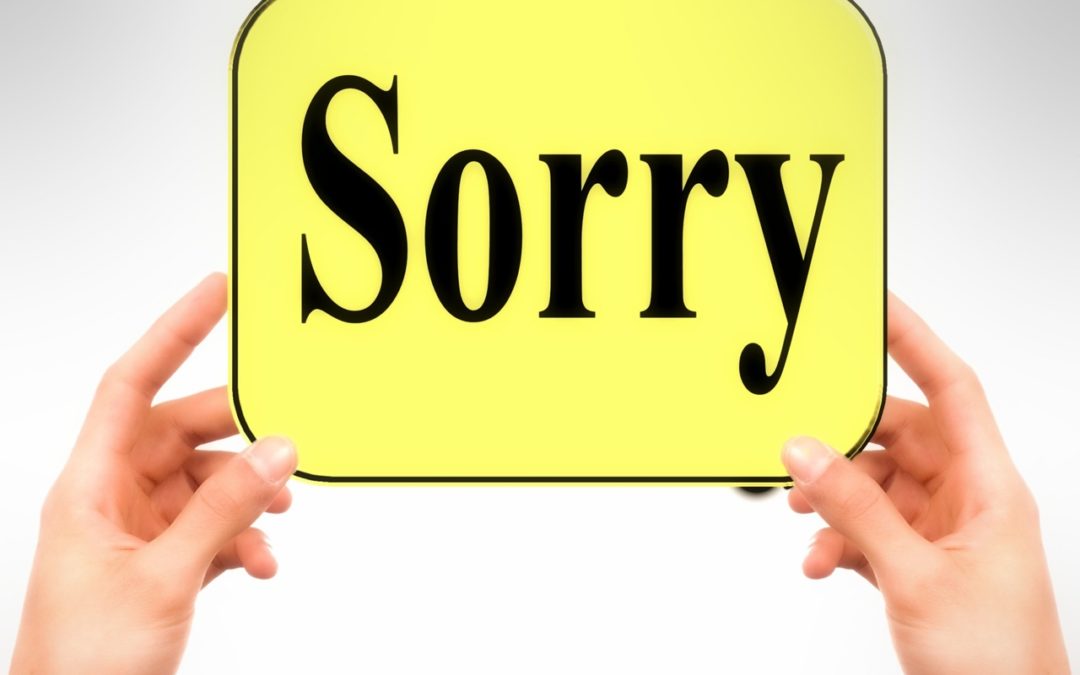You’re one heckava great person. You work hard, you complete your projects on time, you handle all the snarky customers so your co-workers won’t have to, you’re super nice to the new guy down the hall, you bring in doughnuts on your birthday, and you never, ever cook fish in the breakroom microwave. But let’s face it: sooner or later, there may come a time in your career when somebody, somewhere, deserves a sincere apology from you.
Apologies are tough. If you’re like most people, even if you sincerely want to apologize, it’s often difficult to find the right words. After all, most of us don’t get a lot of practice at apologizing, and there certainly aren’t any “Apology 101” classes at your local community college! However, learning to appropriately apologize is an acquirable and useful skill. Let’s dive into some simple, doable tips:
Say you’re sorry! Somewhere in your apology, you absolutely, positively must use the words, “I’m sorry” or “I apologize.” Or maybe both. Euphemisms such as “I blew it” or “I screwed up” are less effective (and sometimes completely ineffective), and I’ll explain why…
It has to do with how we humans process information. Due to our social conditioning, our brains are wired up for certain words to “hit the target” better than others. The words “sorry” and “apologize” create a stronger “cognitive response” (i.e., understanding) in the recipient than an indirect slang expression, so be sure to use what works best: a good, old-fashioned “I’m sorry” apology.
Once is enough. There’s no need to say, “I’m sorry, I’m sorry,” repeatedly. One time is sufficient, or twice at the very most. Actually, saying “I’m sorry” once at the beginning and once at the end of your apology is a method that frames your message quite well, and makes use of the “law of primacy and recency.” Not familiar with the term? Here’s how it works: again, because of the way our brains are wired, in a long paragraph of information, we’re most likely to remember the very first and the very last thing we hear, and the middle parts are less recallable. (By the way, this works with reading information, too.) Between the first and last things you hear, would you like to guess which one is most memorable? It’s the last thing.
So, it works well to say something like, “I’m so sorry that I didn’t introduce you to the new CEO when she came through the office this morning. I simply didn’t see you standing there, and I apologize for my oversight.”
Do not grovel. The last thing you want to do is to become overly self-effacing. Doing so has several downsides. First of all, you can appear insincere if you overdo your “performance” (even if you really mean it), and you might end up being judged as a fake. Secondly, you can actually make matters worse if you manage to amplify your wrong-doing in the mind of the person you’re apologizing to—oops, now they’re really mad at you! And thirdly, you can lower your own feelings of self-worth and make yourself feel horrible if you badmouth yourself in the extreme.
Maintain your self-respect and dignity. You’re coming to your colleague, whether they’re your boss, co-worker or employee, with a well-thought-out and heartfelt apology, and no matter what you’ve done wrong, you do not deserve to be disgraced, sworn at, yelled at, or any other form of retortive abuse. If it happens, politely extricate yourself from the situation, stay out of the “blast zone” for a while, and then relaunch your apology a bit later. You may also need to preemptively ask for support and cooperation from the person you’re apologizing to, before initiating another attempt.
Move on. After you’ve apologized (and hopefully you’ve received an acceptance), it’s important to get back to business. This can be difficult at first, because of the obvious “elephant in the room.” You might feel as if there’s still some tension in the air, but do your best to normalize your relationship with the other person (or people) as soon as possible. Not only will it be a relief to you, but they will appreciate it, as well.
That’s it for today. I hope 2022 is off to a fabulous start for you, and I’ll be back in three weeks. Please send me your suggestions for new topics! I always love hearing from you.

